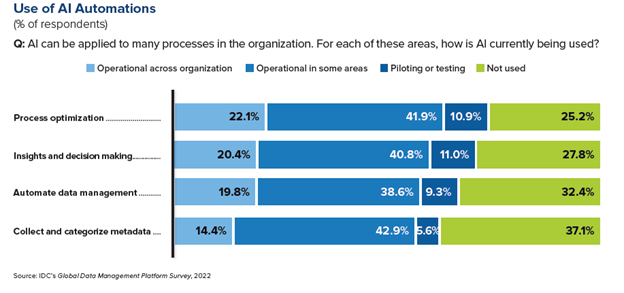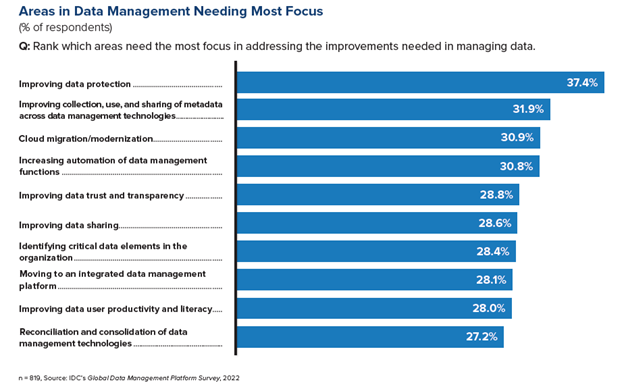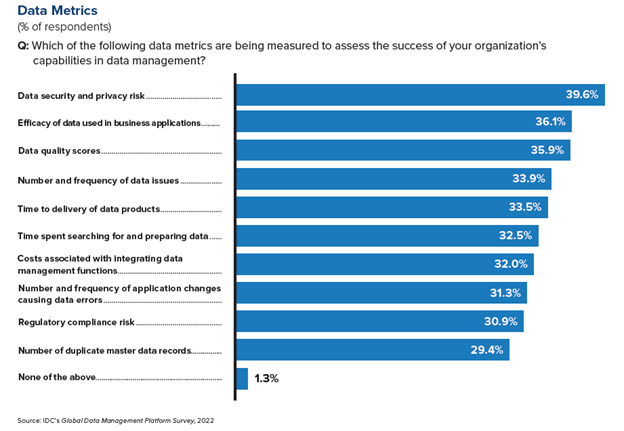4 Critical Considerations for Improving Cloud Data Management Maturity

Especially in today’s competitive environment, you want — and need — to be data-driven to scale your business transformation. But where are you in your data maturity journey? And how do you plan to accelerate that journey? Scaling data-driven transformation demands adoption and improvement of key data management practices and upleveling your data maturity.
The recent IDC White Paper, “The Current State of Modern Data Management: Building an Intelligent Data Enterprise to Improve Business Outcomes,”1 surveyed over 800 data leaders around the globe. Based on their responses, here are the top four considerations for optimizing and improving your data management maturity.
1. Standardized Data Functions
Business requirements are constantly changing as organizations pursue new ways to drive growth. As part of this process, you undoubtedly have embraced multiple point solutions out of a necessity to support legacy requirements and functional silos. According to the IDC White Paper, nearly 20% of an organization’s budget is spent on integrating point solutions. If left unaddressed, the implications are beyond total cost of ownership, resulting in the inability to scale use cases, deliver value in a timely manner and more.
Mature organizations consider and pursue data management standardization as a key imperative to address these challenges. They understand that standardization improves efficiency, accelerates business initiatives and delivers trusted data in a timely manner. It also assures repeatability, allowing to proliferate data-driven decisions across the organization and scale to support more business functions and use cases.
In fact, the IDC survey identified that 40% of organizations that have optimized data management have standardized all functions, whereas only 7% of organizations with reactive practices have done the same. This means optimized organizations are nearly six times more likely to standardize all functions.
2. Intelligent Automation
While most organizations embrace automation, there is room for even greater adoption. Eliminating time-consuming manual tasks can improve efficiency and response time to customers. Think about it. Do your business processes require the same amount of time to execute that they did before they were automated? For example: Do you process loans faster? Do you service patients more quickly? Do you ship products faster?
Automation helps free up people in your organization to focus on high-value initiatives by scaling and improving efficiency of repeatable processes. The use of AI/ML in data management automation is continuing to grow in the quest to reduce manual data management tasks and improve time to value.
For example, modern data management solutions leverage AI/ML to discover and structure data, identify anomalies, classify data, recommend and apply data quality rules, and automate development of data pipelines and data management processes. The increased dependency on data, shortage of talent, and the sheer volume of use cases and data consumers render business processes ineffective and obsolete without adequate automation. Figure 1 depicts the use of AI automation in organizations.

According to the survey, when asked how satisfied the organization is with the value realized from data management automation, 95% of optimized organizations were mostly or completely satisfied. Only 22% of reactive organizations felt the same way. Although more of the optimized organizations are satisfied with the value of intelligent automation, nearly the same percentage (93%) believe that there is room for improvement in using automation to improve business decision making. Only 29% of reactive organizations see the need to improve the use of automation.
3. Unified and Shared Metadata
Metadata is the glue that connects data silos and functional silos. However, organizations now are confronted with metadata silos that hinder delivering value from data. The more each data management function is linked to other data management functions, the greater the efficiency, understanding, compliance and accuracy of decisions. Unification of the metadata across siloed metadata repositories is essential for serving diverse personas in your organization, facilitating data management automation and providing complete visibility and transparency to your business consumers. Figure 2 identifies the need for sharing metadata across the organization.

According to the survey, optimized organizations also manage metadata much differently than reactive organizations. Sixty-eight percent of optimized organizations have one central repository for all metadata, whereas only 5% of reactive organizations have one repository.
4. Effective Data and Analytics Measurement
The notion that you cannot improve what you cannot measure is spot-on for data management. To be effective, you should track, monitor and measure data management processes and associated metrics in areas like data quality, data risks, productivity and time-to-value. Data management solutions should provide out-of-the-box metrics, enabling you to measure the benefits of your investments. Mature organizations leverage data metrics to understand various aspects like cost, risk, data efficacy and ROI. This enables them to optimize investments, align data strategies with business strategies, achieve business buy-in and report success. Figure 3 identifies some of the metrics tracked by organizations.

Learn More About Data Management Trends
If you’re looking for one unified data management platform that can meet these critical considerations, Informatica’s Intelligent Data Management Cloud™ (IDMC) can help. IDMC empowers organizations to standardize data management, drive increased automation, connect metadata silos and measure the business impact of data management investments.
To learn more about the current state of modern data management, download IDC’s 2022 study, “The Current State of Modern Data Management: Building an Intelligent Data Enterprise to Improve Business Outcomes,” now.
1IDC White Paper, sponsored by Informatica, “The Current State of Modern Data Management: Building an Intelligent Data Enterprise to Improve Business Outcomes,” (Doc# US49666322, September 2022)








